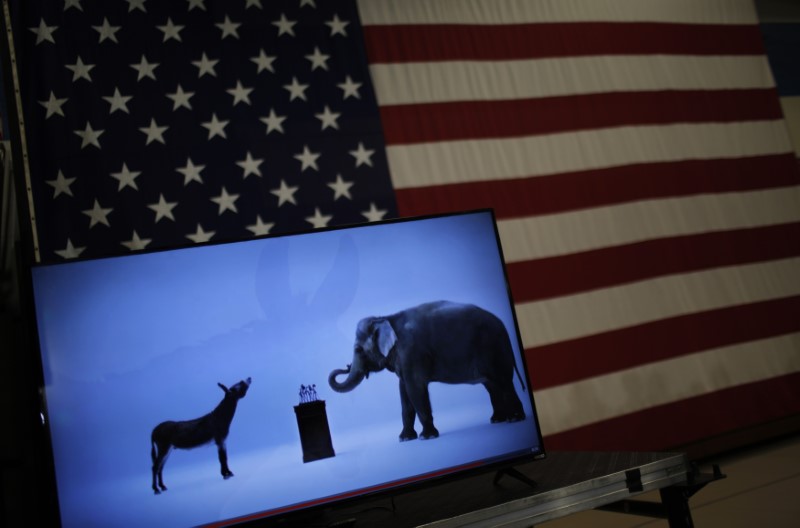By James Oliphant
MONTPELIER, Vt. (Reuters) - Still sifting through the wreckage of the Nov. 8 election, Democratic leaders nationwide are struggling to find a new message to claw back support and avoid years in the political wilderness.
Not only do Republicans control the White House and both the U.S. Senate and the House of Representatives, they now hold 33 governor’s offices.
New England, long considered reliably Democratic, is a prime example of the party's demise.
Republican Phil Scott won in Vermont over Democrat Sue Minter who was criticized, like presidential nominee Hillary Clinton, for failing to develop an economic message that resonated with voters worried about good-paying jobs.
Considered a liberal bastion, Vermont has a tradition of sometimes choosing a Republican governor to keep one party from having too much control.
Elsewhere, Republican Chris Sununu will replace a Democratic governor in New Hampshire while Maine and Massachusetts already have Republican governors.
“We lost the governorship of freaking Vermont,” lamented Washington-based Democratic strategist Chris Kofinis. “We didn’t just lose an election. This was a national rebuke. This was biblical.”
Republicans also command 32 state legislatures and have full control -- meaning they hold the governor’s office and both legislative chambers -- in 24 states, including swing states such as Florida, Ohio, Michigan, and Wisconsin. When President Barack Obama was elected in 2008, they controlled just nine.
“There are more Republicans at the state legislative level than there have ever been,” said Tim Storey, an analyst with the National Conference of State Legislatures.
Republicans scored a major coup when they seized the Senate in traditionally liberal Minnesota, giving it full control of the legislature, and they gained full control of next-door Iowa.
“The party’s message, structure and apparatus are broken,” said Kofinis, who was chief of staff to moderate Democratic Senator Joe Manchin of West Virginia. “We haven’t acknowledged it for years because we had the White House.”
Obama’s two terms masked a crumbling party infrastructure.
During Obama's tenure, Democrats lost over 800 state legislative seats, at least 13 governorships and both houses of Congress.
Party insiders are reluctant to blame the popular Obama but cite plenty of reasons for the decline.
These include a muddled economic message; an overemphasis on emerging demographic groups such as minorities and millennial at the expense of white voters; a perception the party is elitist and aligned with Wall Street; a reluctance to embrace the progressive populism of Senator Bernie Sanders, the former presidential hopeful; and failure to field strong candidates in key states.
There is an emerging consensus, they add, that the party has been too focused on winning national races and has not invested enough in local campaigns, along with a grudging admission that Republicans have done a better job of competing on the ground.
As a result, a poor performance by the Democrats in the 2010 midterm elections gave Republicans control of statehouses across the country, allowing them to redraw legislative maps to fashion districts that would help ensure their long-term electoral success.
“I think the foundation was built back in 2010,” Wisconsin Governor Scott Walker told Reuters. “There was a big wave and then for many of us that were elected in ’10, we got reelected in ’14 in battleground states - Wisconsin, Florida, Ohio, Michigan. You look at the states that were key to the presidential win, were states where Republicans did well in ‘10 and then sustained it.”
“UNDER-RESOURCED”
Democrats are working to recover and looking ahead to governor’s races in New Jersey and Virginia next year to make up lost ground. Governor’s offices have become crucial for another reason: Republican governors signed voter suppression measures in states such as North Carolina that Democrats believe damaged turnout.
Sununu has said that as one of his first acts as governor in New Hampshire, he would like to end the state’s practice of allowing same-day voter registration. As with redistricting, it is another lever of power that Republicans can wield to make sure they remain in the majority for a long time.
Obama has said he will actively support a new party initiative, the National Democratic Redistricting Committee, that seeks to restore state-level Democratic power.
Mark Schauer, a former Michigan congressman who is a senior adviser to the effort, said the goal is to have a central organization direct resources into critical local races. Schauer, who lost his congressional seat after Republican legislators excised his home county from his district, said deep-pocketed Democratic donors have not always appreciated the need to support state races.
“A state senate race isn’t as sexy as a presidential or big U.S. Senate race,” Schauer said.
Jessica Post, executive director of the Democratic Legislative Campaign Committee, the party arm charged with overseeing state races, agreed. “We have felt under-resourced."
When Howard Dean, the former Vermont governor and presidential candidate, ran the Democratic National Committee, he adopted a “50-state strategy,” investing funds in every state, even ones perceived to be hostile to Democrats, in an effort to identify viable candidates for local office.
While Dean’s plan was not the sole reason, Democrats had election successes in 2006 and 2008. When Dean left the DNC, his strategy faded and the party’s fortunes at the state level began to decline.
Dean is a candidate to run the DNC again and has said he will revive the strategy if elected to the post.
“What is happening is a result of decades of smart organizing by conservatives who have very simply poured resources, talent and energy into creating an infrastructure at the state, local, and now national level,” said Bill Lofy, a long-time Democratic strategist in Vermont.
He said Governor-elect Scott “was very effective at making this, in a generic sense, about kitchen-table economic issues in a way that paralleled with the presidential race.” And like Trump, he said, Scott “spent very little time talking about how is going to implement the policies he was proposing. It was more about Scott telling voters: ‘Trust me. I’m on your side.’”
